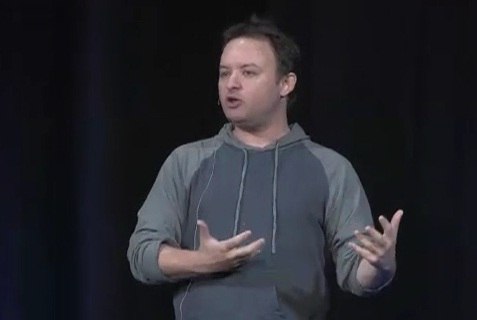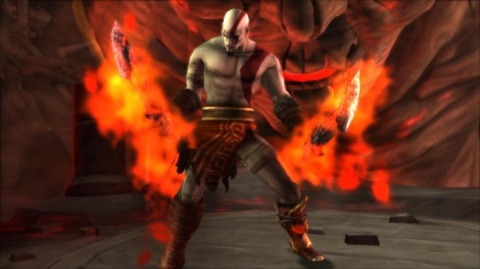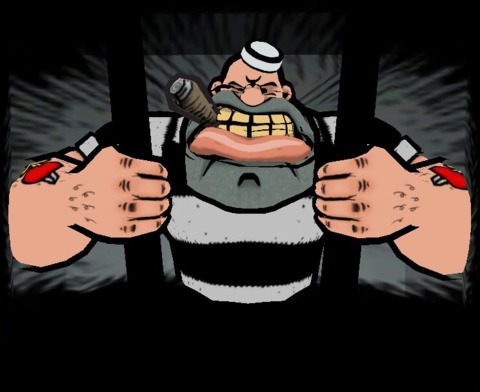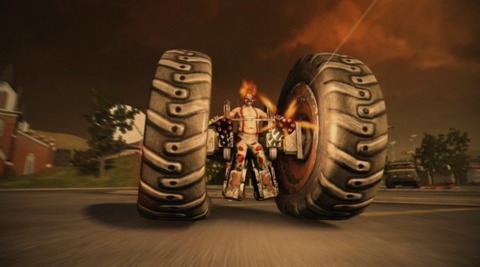David Jaffe on listening to voices
PAX Prime 2011: Twisted Metal director shares his experiences with trusting his instincts and how he got back on the right path after losing his way.
Who was there: Eat Sleep Play cofounder and Twisted Metal director David Jaffe delivered the PAX Prime 2011 keynote address.

What he talked about: Jaffe wasted no time launching into his hour-long keynote address, notably beginning with the word "And." He started off by describing a teenage experience when he attended a talk given by Jeffery Katzenberg, who was at that time leading The Walt Disney Company's motion-picture division. (He now heads up Dreamworks Animation.) Katzenberg had that day released an infamous memo that sparked a firestorm in Hollywood over the way films were made (and inspired Tom Cruise's equally ranting missive in Jerry Maguire).
Jaffe said that as part of that presentation, Katzenberg was asked by an audience member how he should break into the industry. Katzenberg responded along the lines of, "It doesn't matter what the advice is because those who are sitting in the audience that have a calling to create entertainment will find a way. They don't need a road map, and they'll make it any way they can."
This sentiment solidified Jaffe's path as a creator of entertainment, and it also affirmed the sentiment that his parents had instilled in him that he deserved to pursue his passion. He carried this lesson with him when he began working as a game tester at Sony.
Jaffe said that after he joined Sony, he was quickly promoted out of the testing department to a role as assistant producer. During his lunch breaks, he said he and a friend would set up shop in a conference room and build 3D levels out of Lego blocks. At the time, this design process was quite out of the ordinary, and others in the company would speak to him of it as if he should be embarrassed.
However, he found this mentality perplexing, as nearly everyone in the company was still producing 2D-style games that all grew out of the Super Mario Bros. tradition. However, he described these experiments with 3D level design as following his inner voice that told him it was the right thing to do. At one point, he said a senior-level Sony employee approached him and asked why he felt like he had the right to design games. Jaffe responded that it wasn't because he felt he was the best; rather, he simply could, and he was following his passion to do so.

Jaffe then related an experience he had at Sony Santa Monica, when shortly before God of War was officially announced, there was talk of a major change in direction for the game. A producer he admired recommended that the game go more in the direction of Capcom's Devil May Cry series, saying the project as it currently was simply wasn't coming together. However, Jaffe again listened to his inner voice, which helped him push through the doubt and criticism.
The voice turned out to be correct, and God of War began a massive hit franchise for Sony on the PlayStation 2. However, after God of War became huge, Jaffe said that he gradually began to lose touch with his inner voice, and upon reflection, he realized it was for a number of reasons.
The first reason was that he found the voice didn't like it when things were disingenuously being done in its name. After God of War shipped, Jaffe said he went on an extended vacation. When he returned, he began gearing up for his next big thing, which was called Heartland. He described the game as Red Dawn meets Saving Private Ryan, and Jaffe said that he wanted it to serve as a political allegory while also achieving "the Holy Grail of game design," which is to make players cry upon completion for the right reasons.
The problem with this game, Jaffe said, was that he was making it in order to chase after the next big thing, instead of following his passion. The game was eventually given the green light, but it didn't take long for members of the team to be reassigned to work on Sony's reboot of the Warhawk franchise. Jaffe said that if he were honestly in love with Heartland, he would have never let this happen to his team.
After that project collapsed, Jaffe founded Eat Sleep Play and began showing off Calling All Cars. Indie games such as Braid and The Path were gaining acclaim on the small scale, while titles such as Mass Effect, Red Dead Redemption, and Heavy Rain were dominating AAA development. None of these projects appealed to Jaffe, though, and he began to feel like games in general simply weren't touching him. That's when the fear set in, as Jaffe began to feel that because he was getting on in years, he had lost touch with the pulse of the industry.

Jaffe said that at about this time, he was also dealing with some serious anger issues, which also greatly interfered with his ability to tap into his inner voice. The anger arose from a number of different sources. First, he said that he was angry with Sony due to a perceived alienation on his part.
He felt that he had essentially helped build Sony Santa Monica into one of the preeminent game development studios in the world, going so far as picking out the floor tile in the bathroom and selecting the building space. However, after he left that studio, he felt like an outsider, or like the football star that goes back to his old high school several years down the road. Things had changed, and he felt like he had been completely forgotten.
The second source of anger stemmed from getting sued. While skirting details for legal reasons, Jaffe said that Sony and he personally were hit with a lawsuit that boiled down to a claim that they had plagiarized God of War. And while this suit was eventually tossed out, he said it left him bitter for a number of reasons. First, being named on the suit was galling, in that a record of his involvement will be permanently maintained, fallacious as it may be.
What's more, he said that had the suit not been thrown out before heading to court, they very well may have lost due to some personal bias on the jury panel. If they would have lost, he said he'd be marked with a scarlet letter and that work would have been impossible to erase. What's worse, he said, would have been the effect on his kids and the seed of doubt that the suit would have planted in his children's minds that he would be capable of committing an act of plagiarism.
As one last source of anger during this period, Jaffe pointed to a meeting he had with a number of Sony executives over some future PlayStation Network projects that would be produced by Eat Sleep Play. The pitch meeting, as it were, didn't result in the outcome that he wanted, in that while Sony left the door open for him to meet again, the executives didn't outright accept his proposal or offer him an incubation deal to further refine the ideas. Yes, Calling All Cars wasn't a huge success, he said, but it made its money back, and especially given the turmoil over the lawsuit, he felt Sony owed him.
All three of these factors culminated in Jaffe being exceptionally angry, which he said completely disassociated him from his guiding voice.
But then, the recovery occurred. Jaffe said that the return of his voice came while watching The Shop Around the Corner, which was made in 1940 and stars Jimmy Stewart. While watching that film, he said that it occurred to him that everyone involved in the making of this film is now dead. Still, the picture remained relevant and engrossing to him despite being some 70 years old.
This message was hammered home a few days later, when he went to a midnight launch at GameStop. As he was pulling up, he said that he recalled wondering to himself how long the game he's about to buy will resonate, if it will still touch people the way The Shop Around the Corner touched him so long after its creation. At that point, his voice returned, telling him "Great gameplay travels." From there, his mind went to classic games such as Tetris, Ms. Pac-Man, Halo, the original Deus Ex, and others, and it occurred to him that the reason he'd lost touch with the industry was that it had shifted its emphasis away from gameplay and toward set pieces, cutscenes, and other ancillary pursuits. It's gameplay that Jaffe sees as his calling, and that realization prompted him to refocus his efforts on creating great gameplay.

What also helped him regain his voice was the reception that Twisted Metal received at its debut during the 2010 Electronic Entertainment Expo through present day. This reception helped him get back in touch with the idea that there are people out there who understand his voice and the types of entertainment he's attempting to create. He said that he realizes Twisted Metal won't reach the same level of success as Battlefield 3 or Uncharted 3, but there's still a large contingent of people out there who have responded to what he's trying to do, and that's been very affirming to his voice.
Katzenberg also helped, or rather The Katzenberg Method helped Jaffe reawaken his voice. This method, which Jaffe described as, "If they throw you out the front door, you go in the back door. If they throw you out of the back door, you go in the basement. If you get thrown out of the basement, you go in the window. And you never take any of this personally." The mentality underlines the power of tenacity, he said, and it also made him realize that life is short, so it's important to not waste it being angry.
Quote: "Your life is going by so quick, the only thing you can do is the thing you have to do."--David Jaffe
Takeaway: With Twisted Metal, Jaffe believes that he's working from a place where he's being honest to the voice that he built his career on. What's more, he believes he's surrounded himself with people who share his voice and creative outlook, and he believes it will be reflected in the final product.
For more from Jaffe's keynote address, the entire presentation is currently available in streaming video.
Got a news tip or want to contact us directly? Email news@gamespot.com
Join the conversation